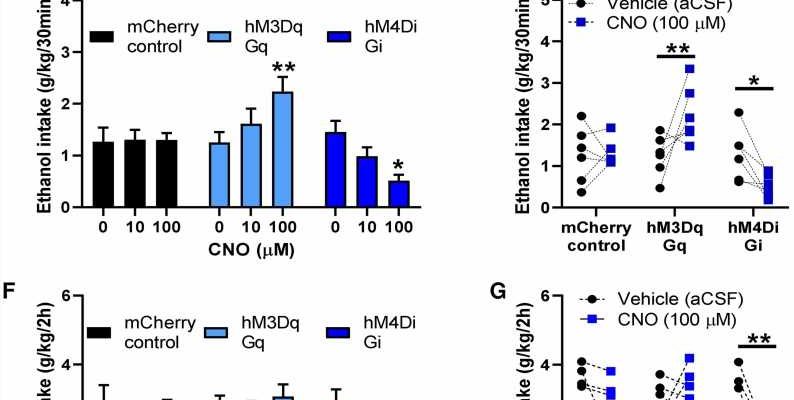![Chemogenetic manipulation of 5-HT<sup>MRN>DG</sup> circuit modulates ethanol intake following long-term exposure. A–C mCherry-control, hM3Dq-excitatory, and hM4Di-inhibitory DREADDs were injected in pet1-5-HT MRN neurons and bilateral cannulae were implanted in the hippocampus, above the dentate gyrus (A). Expression of DREADD constructs in TPH2-immunoreactive MRN neurons was verified by immunohistochemistry (B, field corresponding to the red dashed square in A) and the correct cannulae placement verified by histology (C). Chemogenetic manipulation of 5-HT<sup>MRN>DG</sup> neuron terminals by local infusion of CNO (100 μM) bidirectionally modulated the binge-consumption of ethanol (first 30 min of a 2 h drinking period) (D–E, repeated measure two-way ANOVA, n = 6, treatment x construct: F(4, 30) = 6.545, p = 0.0007). Bonferroni multiple comparison showed that the stimulation of these terminals increased the 30 min intake of ethanol (D–E, **p = 0.074), while their inhibition reduced the binge-intake of ethanol (D–E, *p = 0.013). Chemogenetic manipulation of 5-HT<sup>MRN>DG</sup> neuron terminals also modulated the 2 h consumption of ethanol (F–G, repeated measure two-way ANOVA, n = 6, treatment: F(1.883, 28.25) = 3.902, p = 0.0341), with Bonferroni multiple comparison showing that only the inhibition of these terminals reduced the overall 2 h intake of ethanol (F–G *p = 0.0239; **p = 0.0076), but no effect of chemogenetic activation (p > 0.99). Effect of intra-DG injection of CNO on locomotor activity (H) showing no effect over the 2-hour drinking period (I, One-way ANOVA on AUC [15–135 min], n = 4, F (2, 9) = 0.4343, p = 0.6606). Credit: <i>Molecular Psychiatry</i> (2022). DOI: 10.1038/s41380-022-01789-z Identification of neural circuit that controls alcohol abuse in mice](https://scx1.b-cdn.net/csz/news/800a/2022/identification-of-neur.jpg)
Queensland University of Technology researchers have identified, for the first time, a precise neural circuit in the brain that controls long-term alcohol consumption, in a study in mice.
Professor Selena Bartlett and Dr. Arnauld Belmer were part of the research team who used cutting-edge molecular tools, pharmacology and a neuroscientific approach to target the part of the brain that has shown to be linked to binge drinking patterns. The research is published in the journal Molecular Psychiatry.
“Alcohol dependence is a significant problem in Australia with one in four people aged 18 years and over exceeded the guideline in 2020–21,” Professor Bartlett said.
“The mechanism in the brain driving long-term alcohol dependence is unknown and there are few effective treatment options available.”
Dr. Belmer said the research indicated that using drugs that specifically target the specific part of the brain could potentially represent an innovative strategy to combat alcohol abuse.
“In this study, using novel drugs, we identified the particular 5-HT1A receptor that mediates alcohol drinking behavior,” he said.
“We demonstrated that inhibiting the transmission of serotonin to that receptor reduces alcohol consumption.
“This follows on from our earlier research in mice which showed that two weeks of daily treatment with a drug normally used for treating general anxiety reversed the effects of 15 weeks of binge-like alcohol consumption,” Dr. Belmer said.
Professor Bartlett said the research team would continue to look at new treatment strategies for alcohol abuse and addiction that focus on understanding how to boost neuroplasticity to reboot brain health and fitness
Source: Read Full Article
